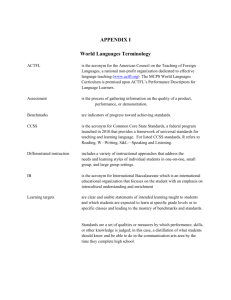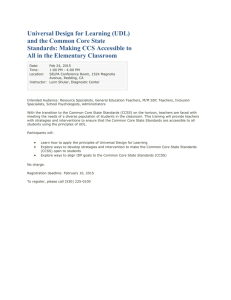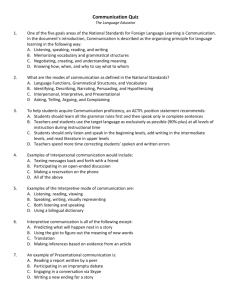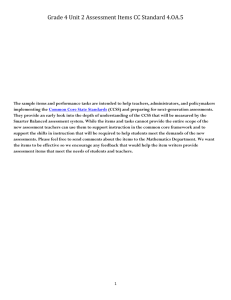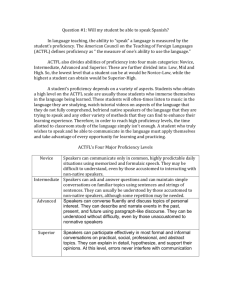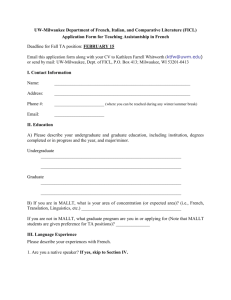CCSS-Alignment
advertisement
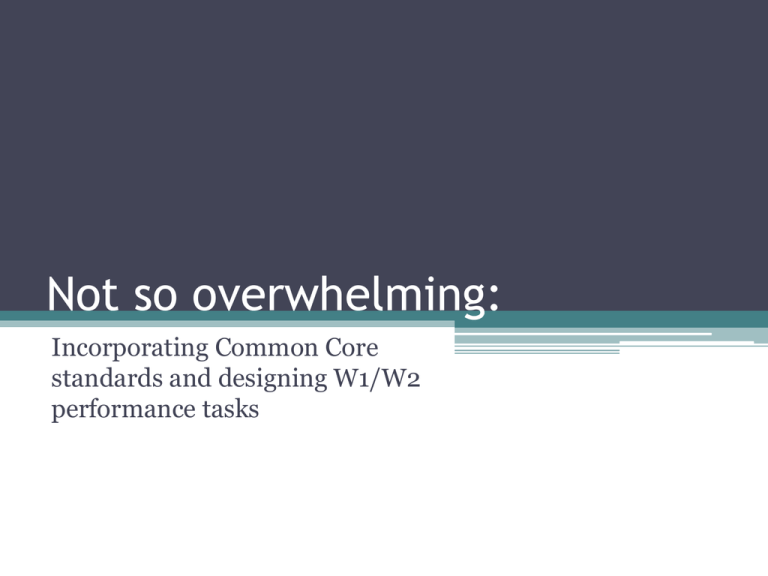
Not so overwhelming: Incorporating Common Core standards and designing W1/W2 performance tasks Agenda • Aligning Common Core Standards with National Standards for Learning Languages (15 min) • Grouping by level (10 min) • Overview of performance tasks (15 min) • Completing performance task outline (leaving here with something you can use!) (20 min) • Questions/Discussion/Sharing(10 min) COMMON CORE What it is and how we can use it Purpose of CCSS (their mission) • The Common Core State Standards provide a consistent, clear understanding of what students are expected to learn, so teachers and parents know what they need to do to help them. The standards are designed to be robust and relevant to the real world, reflecting the knowledge and skills that our young people need for success in college and careers. With American students fully prepared for the future, our communities will be best positioned to compete successfully in the global economy. CCSS: Key Points in Language Arts • Reading ▫ ▫ ▫ ▫ “staircase” of increasing complexity progressive development of reading comprehension diverse array of classic and contemporary literature challenging informational texts • Writing ▫ write logical arguments based on substantive claims, sound reasoning, and relevant evidence ▫ short, focused projects ▫ longer term, in-depth research Key Points in Language Arts • Speaking and listening ▫ gain, evaluate, and present increasingly complex information, ideas, and evidence through listening and speaking as well as through media ▫ one-on-one and whole-class settings • Language ▫ grow their vocabularies through a mix of conversations, direct instruction, and reading ▫ use formal English [or WL] in their writing • Media and Technology ▫ integrated throughout the standards What does this mean for WL? • Nothing on CCSS’ website • Few resources; only ACTFL says: ▫ simple to complex usage ▫ ultimate goal is academic, formal language usage ▫ Main idea: Common Core vs. National Standards Common Core State Standards for English Language Arts and Literacy (Anchor Standards) • Reading • Writing • Speaking and Listening • Language National Standards for Learning Languages • Three Modes of Communication ▫ Interpersonal ▫ Interpretive ▫ Presentational • ACTFL Proficiency Guidelines ▫ Novice ▫ Intermediate ▫ Advanced Basic Alignment: 3 modes + anchor standards (ACTFL’s diagram) Translating proficiency/grade levels ACTFL proficiency levels • Novice-Low/Mid • Novice-High • Intermediate-Low • Intermediate-Mid • Intermediate-High + • Advanced levels CCSS grade level equivalents • Kindergarten/some 1st grade • 1st grade/some 2nd grade • 2nd and 3rd grades • 4th grade/some 5th grade • 6th grade + • 8th grade Identifying target proficiency levels: middle school (alphabetic & logographic) Identifying target proficiency levels: high school (alphabetic languages) Identifying target proficiency levels: high school (logographic languages) Strategies • Start small: add one CCSS standard to each lesson plan. • Don’t worry about the a,b,c standards at first. • Increase CCSS integration into lessons over time. • Don’t overload the lesson with CCSS or National Standards; maintain focus on the primary communication objective for your lesson. • Don’t fret over whether a standard matches your objective exactly in its wording (this drove me crazy at first!). Don’t let this be you. You’re already doing your job wonderfully! No crazy changes from the top will change that. Keep doing what you do. Translating standards: Example 1 Level 1: I CAN describe myself. Possible task: Present a labeled self-portrait to the class; give 5 descriptive phrases about yourself. • Mode of Communication: Presentational (speaking) • ACTFL Proficiency Level: Novice-Low • North Carolina Essential Standards: ▫ NL.CLL.3 = Use single words and simple, memorized phrases in presentations to identify [and describe] people, places, and things. • Common Core State Standards • Grade: Kindergarten • Speaking and Listening • SL.K.4 = Describe familiar people, places, things, and events, and, with prompting and support, provide add’l detail. Translating standards: Example 2 Level 3: I CAN ask and understand others about trips they took Possible task: Jigsaw activity: Identify where your partner went on a map and which geographical characteristics they saw, using (past tense) questions and answers. • Mode of Communication: Interpersonal (speaking/listening) • ACTFL Proficiency Level: Intermediate-low • North Carolina Essential Standards: ▫ IL.CLL.1.2 = Use questions to exchange information in familiar situations. ▫ IL.CMT.1.2 = Carry out unrehearsed interactions […with TL speakers or learners.] • Common Core State Standards • Grades: 2nd and 3rd • Speaking and Listening • SL.3.3 = Ask and answer questions about information from a speaker […]. • SL.3.4 = […R]ecount an experience with appropriate fact and relevant, descriptive details, speaking clearly at an understandable pace. Notes: 9-10 are together; 11-12 are together (VAGUE!). See http://www.corestandards.org/ELA-Literacy/W/introduction-for-6-12 Translating standards: Example 3 Level 5: I CAN express interest in and preferences for career possibilities within or related to the target culture. Possible task: Write a professional cover letter to accompany a résumé. • Mode of Communication: Presentational (writing) • ACTFL Proficiency Level: Advanced-mid • North Carolina Essential Standards: ▫ AM.CLL.3.2 = Produce clear, wellorganized texts for a variety of audiences on concrete, social and professional topics. ▫ AM.CMT.2.1 = Evaluate practices, products, and perspectives related to social and professional topics. • Common Core State Standards • Grades: 8 • Writing • W.8.4 = Produce clear and coherent writing in which the devel., org., and style are appropriate to task, purpose, and audience. • Language • L.8.3 = Use knowledge of lang. and its conventions when writing, speaking, [etc.] PERFORMANCE TASKS What they are and why they work for us Grouping by level (language?) • • • • • • Novice Intermediate Advanced Chinese Japanese Arabic CMS non-negotiables (2013-14) • “All teachers are required to have students complete performance tasks in their discipline areas.” Performance Tasks (W1 and W2) • Definition ▫ goal-directed assessment exercise ▫ often explores a wide range of skills ▫ students are active participants ▫ students demonstrate ability to APPLY knowledge ▫ PRACTICAL ▫ rubrics are essential Purpose of Performance Tasks • Performance tasks result in the students being engaged in the purposeful production or creation of something that is communicated, shared, or used with others for some observable purpose. Student benefits • • • • Develop critical habits of mind Showcase learning in real-world contexts Make students college and career ready Prepare for Next Generation Assessments Performance Tasks (W1 and W2) • Key student functions and their “action words” ▫ Access read, spot, listen, study, feel, identify, notice, observe ▫ Interpret decide, summarize, prioritize, categorize, construct, analyze, defend, describe, compare, contrast, explain, integrate ▫ Plan arrange, create, design, sketch, generate, formulate, form, draw, frame, develop, compose ▫ Produce draw a cartoon, write an editorial/essay/story/blog, film a video, create a website, design a brochure ▫ Disseminate publish, present, interact, distribute, perform, debate, report, show, teach, share, display, discuss, send Writing Tasks (W1 and W2); grades 6-12 • W1 task – write arguments focused on discipline-specific content. ▫ Introduce precise claims, distinguish from other claims, organize ideas. ▫ Develop claims and counterclaims fairly, supplying data and evidence. ▫ Use words, phrases, and clauses to link major sections of text. ▫ Establish and maintain a formal style. ▫ Provide concluding statement. • W2 Task – write informative/explanatory texts. ▫ Introduce topic, organize ideas, include formatting, graphics, and multimedia when appropriate. ▫ Develop topic with relevant facts, definitions, quotations, and details. ▫ Use varied transitions and cohesive devices. ▫ Use precise language and domain-specific vocabulary. ▫ Establish and maintain a formal style and objective tone. ▫ Provide a concluding statement. Performance Tasks (W1 and W2) From tricycle to motorcycle – perfect for language teaching! Entry Points Level W1 Tasks - arg W2 Tasks - inf Motorcycle Scooter Independent Bicycle Training Bicycle (With scaffolding) Tricycle (Without writing/with scaffolding) (With scaffolding) Performance Tasks: Example By: Kim Young, Tabitha Miller, Jinko Dailey • Strand: Intermediate: Low/Mid • Grade level: 2-4 • Communication modes: Interpretive, Interpersonal, Presentational • I-CAN Statements: ▫ I can state my opinion and give supporting reasons using connected sentences. ▫ I can write about using cell phones at school. Performance Tasks: Example Common Core Standards • ELA-Literacy.CCRA.W1 – Write arguments to support claims in an analysis of substantive topics or texts using valid reasoning and relevant and sufficient evidence. • 3.RIT.2 – Determine the main idea of a text; recount the key details and explain how they support the main idea. • 3.RFS.4 – Read with sufficient accuracy and fluency to support comprehension. • 3.W.1 – Write opinion pieces on topics or texts, supporting a point of view with reasons. • 3.SL.3 – Ask and answer questions about information from a speaker, offering appropriate elaboration and detail. Performance Tasks: Example Essential Standards • IL.CLL.1.1 - Carry out unrehearsed conversations on familiar topics with some details. • IL.CLL.1.2 - Use questions to exchange information in familiar situations. • IL.CLL.3.3 - Use a series of phrases and sentences to give spoken and written presentations about familiar topics, situations, and experiences with some details. • IL.CLL.4.1 - Classify cultural practices of people in the target culture and the students’ culture using familiar topics, situations, and experiences. • IL.COD.2.4 - Understand main ideas and a few details in academic texts that contain familiar vocabulary. • IL.COD.4.1 - Analyze cultural practices and perspectives from the target culture with the students’ culture. Performance Tasks: Example Entry Points Level W1 Tasks - arg -Write letter to principal, using supporting ideas and incorporating research (survey). W2 Tasks - inf -Write an article on how cell phones and other technological devices may be used in classrooms of the future. Scooter -Solicit and record peer responses to survey. Independent Bicycle -Create survey in target language. -Describe how technology has impacted student learning, some open-ended comp. check questions. -Describe your article to your peers. -Take notes on peers’ articles. Training Bicycle (With scaffolding) -Read articles. -Answer comprehension questions. Tricycle (Without writing/with scaffolding) -Teacher writes Word Web about cell phone use. -Students yell out words and phrases. Motorcycle (With scaffolding) -Groups of 4; each student with different article. -Read & annotate. PALS vs. CCSS rubrics for W1/W2 • PALS ▫ utilize for language function aspect • CCSS ▫ utilize for task completion aspect YOUR TURN Let the ideas flow! Group work or alone: performance task(s) • Steps for completing each performance task: 1. Identify I-CAN statement and/or objective. -What can the student do at the end of this task? 2. Identify target proficiency level. 3. Incorporate 1 or 2 North Carolina state standards. 4. Incorporate 1 or 2 Common Core state standards (no a,b,c details unless you’re feeling ambitious). Consider CCRs (Career Readiness Standards) for upper levels. 5. Write basic outline, from tricycle to motorcycle. 6. At home, continue to develop each level of the task, adding standards as you go. 7. Post your completed task on the Wiki (please!!). Example Performance Tasks • http://worldlanguages.cmswiki.wikispaces.net/ w1w2performancetasks QUESTIONS/COMMENTS Sources • ACTFL Crosswalk on Aligning CCSS Standards: http://www.actfl.org/sites/default/files/pdfs/CrosswalkFinalAligni ngCCSSLanguageStandards.pdf • CMS Curriculum Project Conference (Sept. 2012/Feb. 2013) • 2012-13 NC Online Writing Instruction: Content-specific SAMPLE assignments • http://www.commoncorestandards.org • CCSS Droid app • The High Performance Toolbox: Succeeding with Performance tasks, Projects, and Assessments (Spence Rogers and Shari Graham) • The Keys to Assessing Language Performance (Paul Sandrock) • ACTFL’s take on Common Core: http://www.actfl.org/commoncore DOCUMENTS -Notes (translating by grade/proficiency level; strategies; diagrams; steps for completing a performance task) -Tricycle W1/W2 planning sheet
